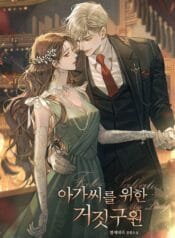Chapter 20
It was well past noon, yet the streets remained unusually dark.
The sky, still heavy with clouds, looked ready to pour at any moment.
Glancing up briefly, Zechart quickened his pace.
The streets, still carrying the scent of earlier rain, were filled with damp, chilly air.
Just as he was about to round a corner, someone stepped into his path.
“We’re conducting a checkpoint. May I see your ID, please?”
The man in the dark uniform was a Stifts officer.
Though the inspection came without warning, Zechart calmly reached into his coat and handed over his identification.
As soon as the officer read it, his face stiffened.
“My apologies, sir. I didn’t realize you were an inspector.”
Snapping to attention with an overly upright salute, the officer looked visibly tense.
Zechart gave a curt nod, expression dry, then gestured with his eyes for him to move along.
The officer promptly turned on his heel and disappeared around the corner.
Resuming his walk, Zechart slipped the ID back into his coat.
It might look forged at a glance—but surprisingly, it was real.
Issued directly by the Hasmal government.
Most agents in his organization held second identities within official state departments.
A convenience, one might say.
Sometimes their missions required access to classified state information.
Hastily fabricated credentials wouldn’t suffice for such tasks, so these identities were prepared in advance.
(To this day, the most absurd example Zechart could recall was Rachel being issued a clerical rank under the Papal Office.)
With proper cover stories in place—“long-term assignment,” “foreign deployment,” and so on—they didn’t actually have to show up for duty.
‘Sometimes I wonder if we really do serve the government,’
Zechart thought vaguely about the organization he belonged to.
Then again, considering one of his recent targets had been a pro-government figure, he couldn’t be too sure of that either.
After walking for some time, he finally reached a stretch of street cordoned off by barricades.
A Stifts officer, stationed amidst the crowd, stepped forward to block his path.
With a faint grimace, Zechart retrieved his ID once again.
In hindsight, perhaps he should’ve worn his Stifts uniform today—he felt a flicker of regret.
“What brings you here, Inspector…?”
One of the higher-ranking Stifts, seemingly the area’s supervisor, came rushing over.
He’d been told the police officials would be waiting in the city hall auditorium where the funeral was to take place, and clearly wasn’t prepared for a superior to appear unannounced.
Rather than offering an explanation, Zechart asked a question of his own.
“This where it starts?”
“Yes, that’s correct. The procession will start from here. It begins here, passes through the central square and the Chief’s residence, and ends at City Hall.”
Just as he said, when Zechart glanced over his shoulder, there were funeral vehicles, dozens of escort cars, and Stifts lined up in a long row, waiting.
After a few more questions and answers, Zechart soon turned away.
He was just there to get a sense of the mood, so this much was enough.
A little ways away from the crowd, he habitually took out a cigarette and put it in his mouth.
Honestly, this was supposed to be Markus’s job.
Searching and gathering intel on the surroundings was always his responsibility.
The problem was that this morning, Markus hadn’t been able to get out of bed.
He was hungover.
It wasn’t his intention, but with the mission temporarily suspended, he was enjoying a rare vacation—one he might not get again soon—and had been out partying every night lately.
According to Rachel, he came back to the safe house dead drunk every single night, so Zechart could pretty much imagine what he looked like.
In the end, the one who was supposed to keep an eye on Herman Miller’s procession and the atmosphere at the funeral couldn’t get up because of a hangover, and Zechart had to go out instead.
‘How does it feel to go to the funeral of the person you killed?’
Rachel’s sarcastic remark flashed through his mind, and Zechart flicked his half-smoked cigarette to the ground. The wet earth quickly snuffed out the ember.
The procession, now ready, began to set off.
***
The funeral procession followed the planned route, and it was after sunset when they arrived at the auditorium where the ceremony would be held.
The mood among the people following the procession became even more somber by then.
When the massive casket was brought in from the hearse, some people even began to sob.
It seemed they were deeply frustrated that even after mobilizing all the Stifts, they still hadn’t caught the killer.
Zechart remembered, for a moment, Herman Miller begging for his life just before his death.
The man who created the camps and took the lives of tens of thousands of Berg people was, in the face of his own death, pitifully small.
Even Zechart, who was usually indifferent to assassinations, had felt a surge of murderous intent.
Blending into the crowd, Zechart shook off these thoughts and slipped away.
He had no intention of staying to watch a funeral that would surely take four hours to finish.
It would be grand, solemn, and strict, just like the other high-ranking officials’ funerals he’d seen before.
With an impassive face, Zechart turned to leave.
He’d barely taken a few steps when, plink, plink, cold raindrops began to fall.
And then came an ominous explosion.
KWA-GWANG!
He stopped dead in his tracks.
His face tensed so hard it made his jaw ache as he stared at the place beyond the auditorium where the explosion had sounded.
Black smoke and fleeting flames flickered in his dark eyes.
No way. A thread of anxiety flashed through his mind.
In an instant, the scene was plunged into chaos.
The startled crowd scattered in disarray, and like ants fleeing an anthill, Stifts poured out of the auditorium entrance.
Armed with guns and swords, they ran in formation toward the rear entrance, where the explosion had occurred.
The falling rain became heavier, one drop at a time.
Zechart stood motionless for a while, even as the rain soaked him through. White steam rose around him from his own body heat.
KWA-GWA-GWA-GWANG!
A second explosion rang out, this time with an ear-shattering roar, unlike the more distant first blast.
Screams burst out everywhere, echoing in his now-muffled ears.
Zechart silently watched the auditorium as the fire began to spread.
Rustle.
He heard something crumbling inside himself.
He realized it was the sound from that cookie he’d eaten a while ago.
That sickeningly sweet taste.
The peace he’d handed to that woman with his own hands.
His head started to heat up.
***
Ssshhh—
Just out of the clock tower, Edith dashed into the pouring rain without hesitation.
She glanced back—the giant Berg flag hanging on the clock tower was soaked with rain.
Maybe it was the cold sinking into her whole body, but her jaw was chattering so hard that her teeth clattered inside her mouth.
Edith hugged the wall of a building as she walked.
Unlike the auditorium, packed with crowds, this place was deserted.
The anxiety in her heart made it impossible to run.
Having entered the city hall disguised as a Stifts officer’s family, if she were discovered somewhere so far from the auditorium, she would never escape suspicion.
She swallowed hard with every step.
Her golden eyes, trembling in the rain, fixed on the corner of a building in the distance.
Once she rounded that corner, she’d be at the entrance leading to the auditorium.
If she could just blend into the chaotic crowd, it would mean she was more than halfway there.
She hadn’t meant to, but her pace kept quickening.
The rainwater thudded to the ground, splattered, and leapt up again, leaving her ears ringing.
So, unfortunately, Edith noticed the presence behind her far too late.
“Stop!”
A man’s voice cut through the rain and stabbed into Edith’s ear.
Frozen like a statue, she stopped dead in her tracks.
The white breath that had been pouring endlessly from her lips vanished in an instant.
“Turn this way.”
Edith hesitated and turned around.
She knew she had to stay calm and not panic, but it wasn’t easy.
Her trembling hand clenched her wet skirt tightly.
When she turned, she saw that there were two people, not just one—a man and a woman.
More precisely, a Stifts officer and a middle-aged woman.
Edith’s eyes darted quickly.
Her gaze swept over the man’s black uniform, pausing for a moment on the gun pointed downward.
Meanwhile, the man signaled to the middle-aged woman with his eyes and asked,
“Are you sure?”
“I told you, I’m sure.”
The middle-aged woman’s narrowed, suspicious eyes turned toward Edith.
She tried to remember the excuses she’d prepared: that she’d been startled by the explosion, panicked and run the wrong way, and just needed directions.
But all those words went blank in her mind.
“I saw it clearly. That woman went into the clock tower and came out.”
That was all Edith heard. Before she could think any further, her body moved first—she started to run.
Splash, splash.
Cold water pooled on the ground splashed up around her ankles as she dashed away.
Her ragged breath turned to white fog, blurring her vision.
And then—
Bang!
A sharp gunshot rang out.






